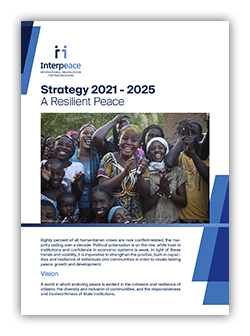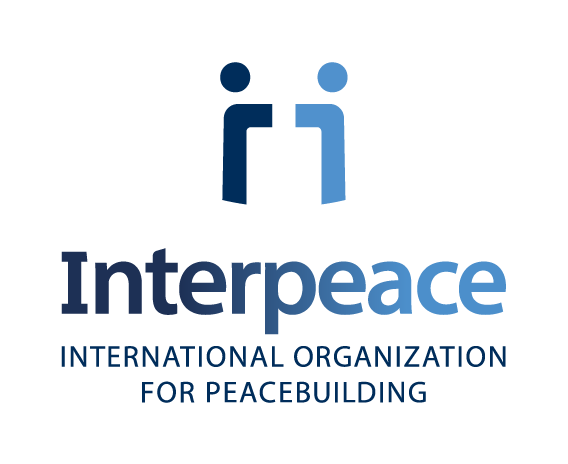Amre Moussa
Chair of Interpeace's Governing Board
Simon Gimson
Acting President of Interpeace
About Interpeace
Our peacebuilding pillars
Strategy 2021-2025
A Resilient Peace
Four in five humanitarian crises are now conflict-related and the majority have lasted for more than a decade. Political polarisation has become entrenched in many societies, with all its harmful consequences. Trust in public institutions and confidence in economic systems have also declined worldwide. The global health crisis caused by the COVID-19 pandemic and its aftermath continued to grip numerous countries in 2022, underlining the degree to which resilience underpins a country’s ability to meet unforeseen challenges.
Our Strategy 2021-2025: A Resilient Peace responds to these trends and contemporary global volatility. It sets the goals in terms of which we will judge how well our practical work, and our policy and thought leadership, create change for the better, in local communities and at national, regional and international level. The Strategy affirms our continued commitment to be thoughtful, bold and innovative – to uphold Interpeace’s original purpose, which was to break through the constraints on contemporary conflict resolution and push forward national and international agendas for peace and growth, such as today’s Sustainable Development Goals (SDGs).
When Interpeace talks of a ‘resilient peace’, we refer to processes and outcomes that address sources of risk and weakness as well as sources of strength. With this in mind, we seek to identify and enhance the capacities of individuals, communities and societies to deal peacefully with grievances in a non-violent way. Our efforts also aim to prevent new patterns of conflict and violence. In addition, we promote changes in national, institutional and international systems that will consolidate gains achieved at community level. This idea of resilience and our efforts to achieve it are woven into each of the five annual workplans, including the workplan for 2022, that convert the five-year Strategy into practical action and results. We have now completed two full years of the Strategy. Our programmes and policy work have continued to focus on what functions positively in societies. We have continued to learn from the past and to look forward. In all we do, we support local communities and their agency and capacity to take the lead in resolving the challenges they confront, including through our commitment to localisation.
Our organisation's strength lies in the support we receive from our many partners and our unity of purpose as “One Interpeace”. As a team, we are committed to supporting each other, to improving and strengthening our shared work, to deepening collaboration, and to increasing diversity and inclusion across geographies, cultures, genders and races. Interpeace and its successes are a collective effort and achievement.
Our Strategy has a clear vision towards which we strive: a world in which enduring peace is evident in the cohesion and resilience of citizens, the diversity and inclusion of communities, and the responsiveness and trustworthiness of State institutions
Amre Moussa
Chair of Interpeace's Governing Board
Simon Gimson
Acting President of Interpeace
About Interpeace
Interpeace is an international organization for peacebuilding. With over 25 years of experience, it has implemented a broad range of peacebuilding programmes in Africa, the Middle East, Asia, Europe, and Latin America.
Interpeace tailors its approach to each society and ensures that its work is locally designed and driven. Through local partners and its own local teams, it jointly develops peacebuilding programmes based on extensive consultation and research. Interpeace helps establish processes of change that promote sustainable peace, social cohesion, and resilience. The organization’s work is designed to connect and promote understanding between local communities, civil society, governments, and the international community.
Interpeace also assists the international community – especially the United Nations – to play a more effective role in peacebuilding, based on Interpeace’s expertise in field-based work at grassroots level. Interpeace achieves this primarily by contributing innovative thought leadership and fresh insights to contemporary peacebuilding policy. It also assists the international community through ‘peace responsiveness’ work, in which Interpeace provides advice and practical support to other international organizations (especially those in the security, development, and humanitarian aid sectors), enabling them to adapt their work systemically to simultaneously address conflict dynamics and strengthen peace dynamics.
Interpeace is headquartered in Geneva, Switzerland, and has offices around the world.
Our peacebuilding pillars
Strategy 2021-2025
A Resilient Peace
Four in five humanitarian crises are now conflict-related and the majority have lasted for more than a decade. Political polarisation has become entrenched in many societies, with all its harmful consequences. Trust in public institutions and confidence in economic systems have also declined worldwide. The global health crisis caused by the COVID-19 pandemic and its aftermath continued to grip numerous countries in 2022, underlining the degree to which resilience underpins a country’s ability to meet unforeseen challenges.
Our Strategy 2021-2025: A Resilient Peace responds to these trends and contemporary global volatility. It sets the goals in terms of which we will judge how well our practical work, and our policy and thought leadership, create change for the better, in local communities and at national, regional and international level. The Strategy affirms our continued commitment to be thoughtful, bold and innovative – to uphold Interpeace’s original purpose, which was to break through the constraints on contemporary conflict resolution and push forward national and international agendas for peace and growth, such as today’s Sustainable Development Goals (SDGs).
When Interpeace talks of a ‘resilient peace’, we refer to processes and outcomes that address sources of risk and weakness as well as sources of strength. With this in mind, we seek to identify and enhance the capacities of individuals, communities and societies to deal peacefully with grievances in a non-violent way. Our efforts also aim to prevent new patterns of conflict and violence. In addition, we promote changes in national, institutional and international systems that will consolidate gains achieved at community level. This idea of resilience and our efforts to achieve it are woven into each of the five annual workplans, including the workplan for 2022, that convert the five-year Strategy into practical action and results. We have now completed two full years of the Strategy. Our programmes and policy work have continued to focus on what functions positively in societies. We have continued to learn from the past and to look forward. In all we do, we support local communities and their agency and capacity to take the lead in resolving the challenges they confront, including through our commitment to localisation.
Our organisation's strength lies in the support we receive from our many partners and our unity of purpose as “One Interpeace”. As a team, we are committed to supporting each other, to improving and strengthening our shared work, to deepening collaboration, and to increasing diversity and inclusion across geographies, cultures, genders and races. Interpeace and its successes are a collective effort and achievement.
Our Strategy has a clear vision towards which we strive: a world in which enduring peace is evident in the cohesion and resilience of citizens, the diversity and inclusion of communities, and the responsiveness and trustworthiness of State institutions

